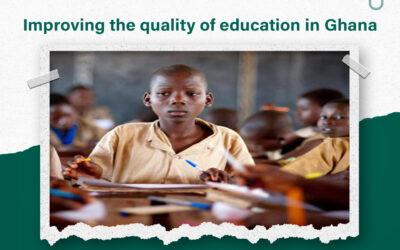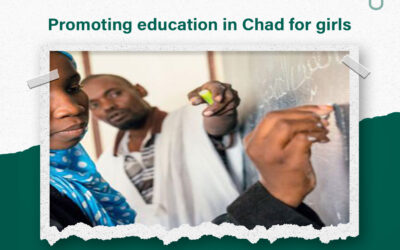Warnings and challenges of the current situation of the
The current situation of the education sector in Mali suffers from numerous warnings and challenges. Education in Mali is affected by the ongoing security crisis, as terrorist attacks and political unrest hinder the process of building infrastructure for schools and universities. In addition, the sector suffers from a lack of infrastructure, material and Human Resources, which affects the quality of Education. It also faces challenges with regard to access to education, registering a high percentage of children without school and a large percentage of illiteracy. Education in Mali is also experiencing a decline in the quality of education and academic performance. In addition, the support of the government and international partners is needed in strengthening the education sector and implementing the necessary reforms. Therefore, there is an urgent need for immediate actions and recommendations in order to improve the current situation of the education sector in Mali.
Introduction
The education sector in Mali is an important topic that requires attention and serious thinking; it faces many challenges and warnings. This section includes an introduction to the problem of the education sector in Mali and its importance, and will highlight the security crisis and its impact on education, as well as the lack of infrastructure, material and human resources. It will also address the challenges of access to education, quality of education and student performance.
The education sector in Mali is in Need The education sector in Mali is in need
Education in Mali
The security crisis and its impact on education in Mali
Mali is experiencing a serious security crisis that is significantly affecting the education sector. Schools and universities are exposed to terrorist attacks and violence, which hampers the learning process and leads to a decline in the level of academic performance. In addition, students and teachers experience anxiety and fear, which affects concentration and engagement in learning. The security crisis in Mali is a major challenge that requires immediate action to ensure a safe and stable educational environment.
Lack of infrastructure and resources
Mali’s education sector suffers from a serious lack of infrastructure and resources. Schools and universities lack classrooms, laboratories, libraries and other equipment that help improve the quality of Education. In addition, the education sector is faced with the problem of lack of financial and human resources, as it lacks sufficient funding to provide continuous training for teachers and improve the dilapidated infrastructure. These problems disrupt the learning process and the progress of education in Mali.
Lack of infrastructure and its impact on the quality of Education
Mali’s schools and universities have a serious lack of infrastructure, and this negatively affects the quality of education in the country. The lack of appropriate classrooms, laboratories and good libraries restricts the ability of teachers and students to engage in the learning process. In addition, the lack of technical equipment such as computers and the internet affects the ability of students to research and academic development. The improvement of infrastructure is crucial to achieving the improvement of the quality of education in Mali.
Lack of financial and human resources in the education sector
Mali suffers from a significant shortage of financial and human resources in the education sector. There is often a lack of funding to provide the necessary supplies for the learning process, such as books, study materials and teaching equipment. There is also a shortage of qualified teachers and teaching staff, which negatively affects the quality of education and restricts the ability to provide adequate and effective education to students. It is necessary to increase funding and provide more qualified human resources to improve education in Mali.

Challenges of access to education
Mali faces significant challenges with regard to children’s access to education. A large percentage of children in the country suffer from not attending school, especially in remote and conflict-affected areas. In addition, illiteracy and a low economic level are obstacles to educational opportunities. Consequently, Mali faces significant challenges in achieving inclusive and equitable education for all students.
The share of children in education and the illiteracy rate
Many children in Mali have difficulty accessing education, as the country has a high illiteracy rate. According to the 2020 UNESCO report, the illiteracy rate in Mali is about 37.8% among adults, something that negatively affects the share of children in education. This ratio is a major barrier to an inclusive education for all in the country.
The education sector in Mali is struggling
The impact of economic and social factors on educational opportunities
The impact of economic and social factors on educational opportunities in Mali is significant and tangible. The country suffers from poverty and significant socio-economic disparities, which negatively affects children’s chances of getting a quality education. Poor and marginalized groups in society find it difficult to access education due to the lack of financial resources and the social marginalization they suffer from. These factors are a major obstacle that needs to be radically addressed to achieve positive change in the education sector in Mali.
Quality of education and academic performance
The quality of education in Mali faces significant challenges that affect the academic performance of students. The sector suffers from a lack of qualification and training of teachers, the uniqueness of educational programs, the lack of modern educational resources. Students also have poor literacy and numeracy skills. To improve the quality of education, it is required to modernize the curriculum, develop the capabilities of teachers and provide the necessary resources.
Improving the quality of education in Mali
Improving the quality of education in Mali is essential for sustainable progress in the educational sector. This requires updating the curriculum to be matched to the needs of the labor market and providing continuous training for teachers to develop their teaching skills. Modern resources should also be provided and the exchange of experience and learning between schools and teachers should be promoted, as well as the integration of technology in education should be promoted. These measures will contribute to enhancing the quality of education and raising the level of academic performance of students in Mali, and of course this is what AHAD seeks through the many ongoing charity that it receives.

Drilling a well in Mali
The problem of declining academic performance
The education sector in Mali is suffering from the problem of declining student academic performance. This is mainly attributed to the many challenges faced by the educational system, such as the lack of infrastructure and resources, and the impact of the security crisis on access to quality education. The educational system of Mali should develop effective measures and programs to improve the quality of education and enhance the academic performance of students.
The role of government and international partners
The Malian government plays a key role in supporting and developing the education sector in Mali. The government is working to implement educational policies and programs and provide the necessary resources to improve the quality of education and enhance academic performance. In addition, the government is collaborating with international partners, such as UNICEF, UNESCO and the World Bank, to provide funding and technical assistance to promote education in Mali and achieve global educational goals.
Government policies to support the education sector
The Malian government is implementing multiple policies and programs to support the country’s education sector. These policies include increasing the education budget and providing the necessary resources to improve the quality of Education. The government also places special emphasis on the development of school infrastructure, updating the curriculum and developing the skills of teachers. These policies are aimed at promoting education and achieving positive change in the education sector in Mali.
The role of international partners in promoting education in Mali
International partners play an important role in strengthening the education sector in Mali. They contribute to increasing funding and providing the necessary resources to improve the quality of education and provide educational opportunities to as many students as possible. They also provide technical support and training for teachers, help with curriculum development, promote innovation and research in the field of Education. International partners are working in collaboration with the Malian government to achieve positive change in the education sector in Mali.
Required actions and recommendations
Mali needs to take immediate action to improve the current situation of the education sector. The government should increase funding for education and strengthen infrastructure and human resources. Children should also be provided with educational opportunities and create an educational environment that encourages learning. Moreover, the training and professional development of teachers should be strengthened and the quality of education should be enhanced by updating the curriculum. Also recommend the need to strengthen cooperation with international partners to promote investment in education and the exchange of knowledge and experience.
Ways to improve the current situation of the education sector in Mali
Mali needs to take immediate action to improve the current situation of the education sector. The government should increase funding for education and strengthen infrastructure and human resources. Children should also be provided with educational opportunities and create an educational environment that encourages learning. Moreover, the training and professional development of teachers should be strengthened and the quality of education should be enhanced by updating the curriculum. Also recommend the need to strengthen cooperation with international partners to promote investment in education and the exchange of knowledge and experience. Community participation and attention to the education of girls and women must also be strengthened to achieve positive long-term change.
The participation of civil society in achieving the necessary changes
Civil society plays a crucial role in bringing about the necessary changes in the education sector in Mali. They can promote awareness of the importance of education and pressure the government to increase funding, improve infrastructure and provide education opportunities for all. Civil society can also contribute to improving the quality of education by monitoring academic performance and making recommendations for development. There must be strong cooperation between the government and civil society to achieve the necessary changes and upgrade the education sector in Mali.
Related articles:
The importance of donating to build a well in Africa




